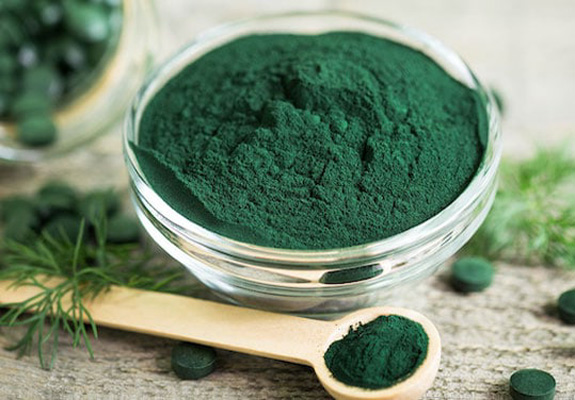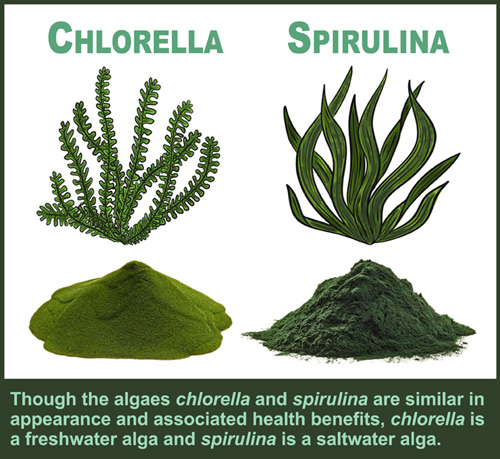Spirulina is a type of algae that has grown in popularity as a nutritional supplement in recent years. Other types of algae that are popular as supplements include chlorella and kelp.
Algae are a large and diverse group of photosynthetic, plant-like organisms that use chlorophyll in capturing light energy; however algae lack normal characteristic plant structures such as leaves, roots, flowers and seeds.
Algae can grow in freshwater, saltwater, or a combination of both. (To learn more about the different algae see our previous post here.)
While kelp is known for its high iodine content, and for its versatility as a food in many parts of the world, each algae has certain constituents that are deemed advantageous for different aspects of health.
The blue-green powerhouse
Spirulina, which grows in saltwater conditions and has a unique blue-green color, is known for boosting energy, improving mental clarity, and aiding weight loss by reducing hunger.
Spirulina contains a unique, water-based, antioxidant pigment called phycocyanin. This pigment has been shown to possess powerful neuroprotective and anti-inflammatory properties.
These anti-inflammatory benefits are so potent that spirulina was part of a regimen used to treat victims of the catastrophic nuclear accident at the Chernobyl Nuclear Power Plant in the former Soviet Union in 1986.
Spirulina is also high in protein, essential amino acids, vitamins, minerals and other antioxidants.
Now a new study, building on earlier research, has demonstrated that spirulina is beneficial in reducing muscle stress and improving performance of athletes.
The study, published in Nutrients in July 2024, was conducted on Italian water polo players.
According to the researchers, studies to date have shown that spirulina prevented exercise-induced oxidative stress, inflammation and muscle damage. They also noted that spirulina increases glutathione levels and reduces lipid peroxidation caused by strenuous exercise.
Study details
To test the earlier findings researchers at the University of Catania evaluated the effects of supplementation with a spirulina and copper combination in a group of 20 male water polo players.
The supplement was provided twice daily for a period of eight weeks to half the athletes, while the other half served as the control group.
Subjective evaluations were completed using the industry standard Athlete’s Subjective Performance Scale (ASPS). ASPS is a 15-item survey designed to evaluate athletes’ perceptions of their performance and experiences across various topics, such as general performance, sport-specific skills, motivation, recovery and mental focus.
In addition, blood tests to measure creatine phosphokinase levels, a biomarker for muscle stress and damage, were performed after a 12-hour overnight fast. This was done on a schedule coinciding with the baseline ASPS questionnaire. This was then followed by a post-intervention blood sample collection after another 12-hour fast.
The researchers reported that the spirulina group’s mean total ASPS score increased significantly from baseline to follow-up and was significantly better than that of the control group. In fact, the ASPS ratings in the control/placebo group slightly decreased.
For muscle stress tracking, the researchers found that the creatine phosphokinase levels increased in both groups—which is normal due to intense training—however the spirulina group exhibited lower muscle stress.
Other anti-inflammatory factors
In addition to the highly-beneficial phycocyanin constituents, spirulina is also known for being a potent source of essential fatty acids—providing further anti-inflammatory potentcy.
Spirulina is rich in Docosahexaenoic acid (DHA) and gamma-Linolenic acid (GLA). GLA is an Omega-6 fatty acid, but its metabolism in the body similar to that of Omega-3 fatty acids—meaning it provides anti-inflammation, hormone-balancing and brain protection properties.
“A dietary supplement containing spirulina and copper may have beneficial effects on reducing muscle stress and improving subjective performance measures in water polo players,” the researchers wrote in the study conclusions. “The findings of this clinical case series may contribute to the development of targeted nutritional strategies for athletes engaging in high-intensity sports.”
Related study
A November 2023 random controlled trial, also published in Nutrients, found supplementation with spirulina in conjunction with exercise resulted in significant improvements in markers of inflammation in men with obesity.
Spirulina can be found in Exposure Protection Pak from Optimal Health Systems.
– – –
Sources: Nutrients (July 2024 study), Nutrients (Nov. 2023 study), Wikipedia (phycocyanin).



